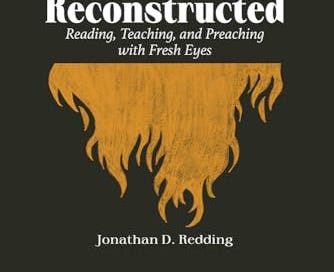Jonathan D. Redding
Daniel Reconstructed: Reading, Teaching and Preaching with Fresh Eyes
Waco: Baylor University Press, 2024.
Review by Daniel Zeunert
You remember Daniel in the lion's den. You probably don’t remember what’s in chapter nine. You will find the interpretative lens of this commentary is also ‘you’. You might think that’s a good thing or a bad thing, but Redding’s new commentary, Daniel Reconstructed, certainly delivers on its promise to offer a novel reading.
In the book, Redding owns his Christian faith in approaching the text, while simultaneously mounting an onslaught against most traditional Christian readings of Daniel. This book’s approach is to deconstruct with the aim of reconstruction, and the author strives ‘not [to] tell an audience what Daniel means. Rather, this approach opens interpretive possibilities.’ Certain sections of Daniel Reconstructed are commendable, others are quirky, and some are downright contradictory. All these reactions are expected and welcomed by Redding, as he aims to shake up the status quo in the study of the book of Daniel and apply it largely to contemporary American socio-politics.
Anti-imperial sentiment?
A common deconstructive reading of Daniel sees the book as a subversive critique of empire. However, Redding isn’t convinced that Daniel’s rise to power in the Babylonian and subsequently the Persian empire shows any sign of him secretly plotting to overthrow the establishment. One might have expected a liberal theologian to fall in line with an anti-imperial reading. This is a surprising move from Redding, and one that shows he is truly attempting to read the book “with fresh eyes” as the title suggests. He comments that, ‘Daniel's actions ensure the safety of an elite group of politically and socially connected Babylonians, a move countering any sense of anti-imperial sentiment.’
While his rejection of an anti-imperial reading of Daniel might seem to agree with traditional interpretations, Redding’s conclusions are radically different. In the commentary, he accuses the character of Daniel of securing a comfortable position in the empire with the elite while not doing anything to seek to overthrow the regime that has taken away the “innocent people” of Israel into exile. This is the first place where Redding misses the mark. In the eyes of the prophets, the people of Israel were anything but innocent. Daniel had access at the least to the prophet Jeremiah, in which he would have read that Israel was a ruined loincloth (Jer 13:1-11), and also an exhortation for the exiles to “seek the good of the city” where God sent them into exile (Jer. 29:7). This commentary’s presentation of a selfish Daniel and an undeserving punishment for the nation of Israel is out of touch with the prophetic voices of the Hebrew Bible, and frankly with the book of Daniel itself.
Absent God?
Perhaps the most striking deconstruction attempted in this commentary is the claim that God is rarely present and not sovereign. To be fair, Redding’s motivations seem to be railing against the deification of Christian tradition, not wanting to blindly accept historical interpretation from the likes of Jermone, Tertullian, Calvin and Luther just because they are giants of church history. On the matter of God’s sovereignty, however, Daniel Reconstructed swings too far in the opposite direction. For example, the fact that Israel was allowed to be taken into captivity shows that God is not sovereign, and the trial of the fiery furnace in chapter 3, ‘satirizes God's apparent passive indifference, thereby highlighting the need to reconsider this very thing that people call "God". These interpretative options ignore basic clues in the text like the fact that it is the LORD who gives the king of Judah into Nebuchadnezzar’s hands (Dan 1:2), and it minimises the faithfulness of Daniel’s friends and God’s response in protecting them (Dan 3:17, 25). It seems if an interpretative option has existed for longer than 50 years, it’s on the chopping block.
Anti-semitic interpolations?
Another major thrust of this commentary is that any attempt to see Jesus in the book of Daniel is, ‘anti-Semitic supersessionism of the highest order.’ Out of all Redding’s novel proposals, this one is his least convincing. Redding makes clear from the outset that he is a Christian, so one wonders how the Christ of his Christianity would interpret the book of Daniel. Jesus was no stranger to the book of Daniel - self identifying as the son of man and making reference to the abomination of desolation. As someone who works in Jewish ministry, I’m more alert to anti-Semitism within Christian tradition than most. Labelling Christological interpretation of Old Testament messianic passages as “anti-semitic” trivialises the term. It detracts from real anti-semitic attacks like the abhorrent targeting of Jewish schools and synagogues, which we have seen an alarming rise of in the past few years.
Reddings new commentary on Daniel has certainly brought something new to the table. However, ‘Daniel Deconstructed’ would be a better title for Redding’s commentary - his promise of reconstruction is never born out in this book.
Daniel Zeunert is an Academic Tutor at Ridley College, Melbourne.





Thanks for the Dr. Bird. I’m glad you brought up the term deconstructing in the world of interpretation. It seems now “Deconstructing Christianity “ is very trendy nowadays especially all over YouTube. There are so many Ex-evangelicals or Ex- Christians etc. It’s very sad some are falling away from the Christian faith because of the “Deconstructing Christianity fad” but we were warned by Jesus and the Apostle Paul this would come to pass. I guess we can blame Bart Earhman he pretty open the door for all this 20 plus years ago
I'm still binging Daniel resources, especially Achaemenid stuff, like the work of Jason Silverman. Hadn't bought this yet, but it's on the list. For now...